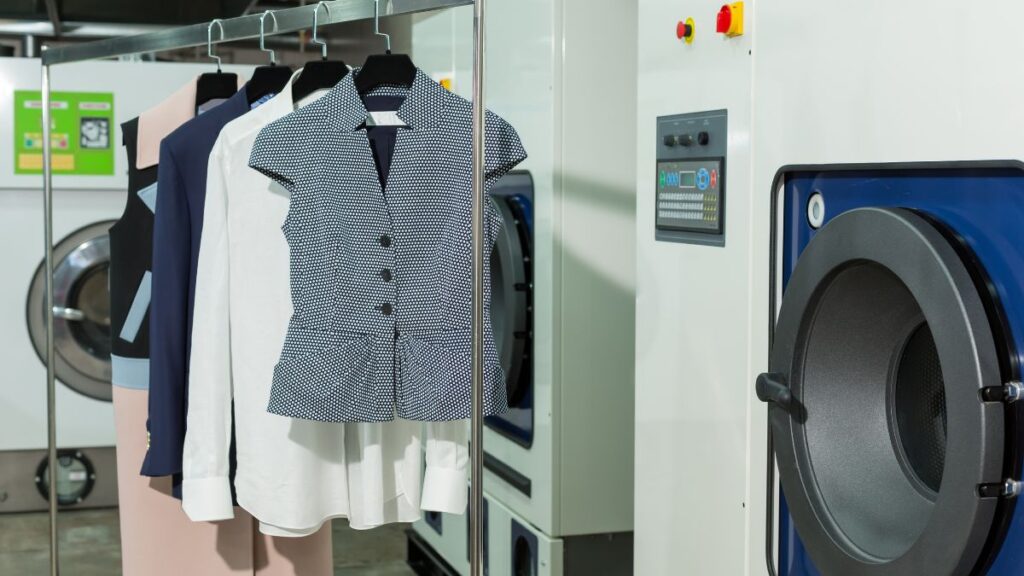So, you want to start a dry cleaning business in Kenya?
Excellent choice.
The demand for professional garment care is on the rise, and with the right approach, you can carve out a profitable niche for yourself.
But let’s be real, launching any business can feel like navigating a minefield.
That’s where this guide comes in.
Consider this your roadmap to dry cleaning domination in Kenya.
We’ll cover everything from understanding the market to mastering the art of customer acquisition.
Get ready to transform your entrepreneurial dream into a reality.
How to Start a Dry Cleaning Business in Kenya
Follow these steps to start a dry cleaning business in Kenya.
1. Understand the Kenyan Dry Cleaning Market
Before you dive headfirst into the dry cleaning business in Kenya, you need to understand the lay of the land.
What’s the demand like?
Kenya’s middle class is expanding, and with it, the demand for convenient, high-quality dry cleaning services.
Busy professionals, event attendees, and those who simply value well-maintained clothes are your ideal customers.
Who are your competitors?
Identify your competition.
Are there established dry cleaners in your area?
What services do they offer?
What are their prices?
Knowing your competitors will help you differentiate your business and attract customers.
What are the local trends?
Are there any specific needs or preferences in your area?
For example, are eco-friendly dry cleaning solutions in high demand?
Understanding local trends will give you a competitive edge.
Actionable Advice:
- Conduct thorough market research: Visit existing dry cleaners, talk to potential customers, and analyze online reviews to gather valuable insights.
- Identify your niche: Consider specializing in a specific type of garment care, such as wedding gowns, delicate fabrics, or express service.
- Analyze pricing strategies: Determine the optimal pricing structure for your services while remaining competitive.
2. Craft Your Dry Cleaning Business Plan
A solid business plan is the foundation of any successful venture.
It’s your roadmap to profitability, outlining your goals, strategies, and financial projections.
Here’s what your dry cleaning business plan should include:
- Executive Summary: A concise overview of your business concept, goals, and competitive advantage.
- Company Description: Details about your business structure, location, and target market.
- Market Analysis: Your research findings on the dry cleaning industry in Kenya, including demand, competition, and trends.
- Services Offered: A comprehensive list of your dry cleaning and laundry services.
- Marketing and Sales Strategy: Your plan to attract and retain customers, including pricing, promotions, and advertising.
- Operations Plan: The day-to-day running of your business, including equipment, staffing, and workflow.
- Financial Projections: Your estimated startup costs, revenue projections, and profitability analysis.
Actionable Advice:
- Be realistic: Set achievable goals and make accurate financial projections based on your market research.
- Seek professional advice: Consult with a business advisor or mentor to refine your business plan.
- Use your business plan as a guide: Regularly review and update your plan as your business evolves.
3. Secure Funding for Your Dry Cleaning Business in Kenya
Starting a dry cleaning business in Kenya requires capital investment.
You’ll need funds to cover:
- Equipment: Dry cleaning machines, washers, dryers, ironing boards, steamers, and other essential tools.
- Rent and Utilities: Securing a suitable location and covering ongoing utility costs.
- Supplies: Detergents, solvents, hangers, packaging materials, and other consumables.
- Marketing and Advertising: Promoting your business to attract customers.
- Licenses and Permits: Obtaining the necessary legal approvals to operate your business.
Where can you find funding?
- Personal Savings: Invest your own funds to demonstrate commitment and reduce reliance on external financing.
- Loans: Secure a business loan from a bank or microfinance institution.
- Investors: Seek funding from angel investors or venture capitalists.
- Grants: Explore government grants or programs designed to support small businesses.
Actionable Advice:
- Develop a detailed financial plan: Clearly outline your startup costs and funding requirements.
- Shop around for the best loan terms: Compare interest rates and repayment options from different lenders.
- Prepare a compelling pitch for investors: Highlight your business’s potential for profitability and growth.
4. Choose the Perfect Location for Your Dry Cleaning Business in Kenya
Location, location, location.
It’s a cliché for a reason.
The right location can make or break your dry cleaning business.
Here’s what to consider:
- Visibility and Accessibility: Choose a location with high foot traffic and easy access for customers.
- Competition: Analyze the proximity of existing dry cleaners to avoid direct competition.
- Demographics: Consider the demographics of the area and ensure it aligns with your target market.
- Rent and Utilities: Factor in the cost of rent and utilities when evaluating potential locations.
- Space and Layout: Ensure the space is adequate for your equipment, workflow, and customer service area.
Actionable Advice:
- Conduct a site analysis: Visit potential locations at different times of the day to assess foot traffic and accessibility.
- Negotiate lease terms: Secure favorable lease terms with your landlord, including rent, duration, and renewal options.
- Optimize your space: Design a functional and visually appealing layout for your dry cleaning shop.
5. Acquire Essential Dry Cleaning Equipment in Kenya
Investing in high-quality equipment is crucial for delivering exceptional dry cleaning services.
Here’s a breakdown of essential equipment:
- Dry Cleaning Machine: The heart of your operation, used for cleaning delicate garments with solvents.
- Washers and Dryers: For laundering everyday clothes and pre-treating heavily soiled items.
- Ironing Boards and Presses: For achieving crisp, wrinkle-free finishes on various garments.
- Steamers: For removing wrinkles and refreshing delicate fabrics.
- Packaging Materials: Hangers, garment bags, and tags to protect and present cleaned items.
| Equipment | Description | Price Range (KES) |
|---|---|---|
| Industrial Dry Cleaning Machine | 8kg to 25kg capacity, suitable for commercial use | 3,100 – 3,500 USD (approx. 450,000 – 525,000 KES) |
| Washing Machine | Fully automatic, various capacities (12kg to 100kg) | 1,789 – 12,380 USD (approx. 250,000 – 1,800,000 KES) |
| Dryer | Industrial dryers to match washing machine capacity | 2,100 – 2,180 USD (approx. 300,000 – 320,000 KES) |
| Pressing Iron | Heavy-duty with adjustable temperature settings | 150 – 500 USD (approx. 22,000 – 75,000 KES) |
| Steam Press | Used for pressing garments efficiently | 200 – 600 USD (approx. 30,000 – 90,000 KES) |
| Sorting Bins | For organizing laundry by color or customer | 50 – 200 USD (approx. 7,500 – 30,000 KES) |
| Hangers & Garment Covers | Essential for storing cleaned garments | 0.10 – 1 USD per piece (approx. 15 – 150 KES) |
| Cleaning Chemicals | Detergents and stain removers for various fabrics | Varies widely; typically around 5 – 50 USD per item (approx. 750 – 7,500 KES) |
Actionable Advice:
- Research different brands and models: Compare features, efficiency, and pricing before making a purchase.
- Consider energy-efficient options: Reduce your operating costs and environmental impact.
- Invest in reliable equipment: Choose durable machines that can withstand heavy use.
6. Source Quality Dry Cleaning Supplies
Using high-quality supplies is essential for achieving optimal cleaning results and preserving garment integrity.
Here’s what you’ll need:
- Detergents and Solvents: Choose eco-friendly options that are effective and safe for various fabrics.
- Spotting Agents: For treating specific stains and ensuring thorough cleaning.
- Fabric Conditioners: To maintain the softness and texture of garments.
- Hangers and Garment Bags: To protect cleaned items and provide a professional presentation.
- Tags and Labels: For identifying customer orders and providing care instructions.
Actionable Advice:
- Partner with reliable suppliers: Establish relationships with suppliers who offer consistent quality and timely delivery.
- Consider bulk purchasing: Reduce costs by purchasing supplies in bulk.
- Store supplies properly: Maintain the quality and effectiveness of your supplies by storing them in appropriate conditions.
Read also: List of Dry Cleaning Business Equipment in Kenya (+ Prices)
7. Master the Art of Customer Acquisition
Attracting and retaining customers is the lifeblood of any successful dry cleaning business.
Here’s how to master the art of customer acquisition:
- Pricing Strategy: Offer competitive pricing while ensuring profitability. Consider offering discounts for first-time customers or bulk orders.
- Promotions and Specials: Run promotions and specials to attract new customers and incentivize repeat business.
- Advertising and Marketing: Utilize various marketing channels to reach your target audience, including online advertising, social media, flyers, and local partnerships.
- Customer Service: Provide exceptional customer service to build loyalty and generate positive word-of-mouth referrals.
Actionable Advice:
- Develop a strong brand identity: Create a memorable brand name, logo, and messaging that resonates with your target market.
- Build an online presence: Create a website and social media profiles to showcase your services and connect with customers.
- Offer loyalty programs: Reward repeat customers with exclusive discounts or perks.
8. Provide Exceptional Customer Service
In the service industry, customer service is king.
Here’s how to provide exceptional service that keeps customers coming back for more:
- Be responsive and attentive: Promptly address customer inquiries and concerns.
- Offer personalized service: Remember customer preferences and provide tailored recommendations.
- Handle complaints with professionalism: Resolve customer issues fairly and efficiently.
- Maintain a clean and welcoming environment: Create a positive first impression with a tidy and well-organized shop.
Actionable Advice:
- Train your staff on customer service best practices: Equip your team with the skills and knowledge to handle customer interactions effectively.
- Collect customer feedback: Regularly seek feedback to identify areas for improvement.
- Go the extra mile: Surprise and delight customers with unexpected gestures, such as offering a complimentary garment bag or delivering orders personally.
9. Ensure the Success of Your Dry Cleaning Business in Kenya
Starting a dry cleaning business is a journey, not a destination.
Here are some key factors to ensure your continued success:
- Quality Control: Maintain consistent high standards for cleaning and garment care to build a reputation for excellence. Implement quality checks throughout your process to minimize errors and ensure customer satisfaction.
- Efficiency: Streamline your operations to maximize productivity and minimize turnaround time. Implement efficient workflow systems and invest in technology to automate tasks where possible.
- Adaptability: Stay ahead of industry trends and adapt your services to meet evolving customer needs. Consider expanding your offerings to include specialized cleaning, repairs, or alterations.
- Financial Management: Keep a close eye on your finances, monitor expenses, and track profitability. Regularly review your financial statements and make adjustments as needed to ensure long-term sustainability.
Actionable Advice:
- Invest in ongoing training: Keep your team updated on the latest cleaning techniques and industry best practices.
- Embrace technology: Utilize software for managing orders, tracking inventory, and analyzing customer data.
- Seek customer feedback: Regularly solicit feedback to identify areas for improvement and stay attuned to customer preferences.
- Network with industry professionals: Attend industry events and connect with other dry cleaning business owners to share knowledge and best practices.
10. Tools To Help You Grow
When running a dry cleaning business in Kenya, technology can be a powerful tool for growing. Here’s how to leverage technology to your advantage:
- Point of Sale (POS) System: Implement a POS system to streamline transactions, manage inventory, and track sales data.
- Online Ordering and Scheduling: Offer online booking options for customers to schedule pickups and deliveries at their convenience.
- Customer Relationship Management (CRM) Software: Utilize CRM software to manage customer data, track interactions, and personalize communication.
- Social Media Marketing: Engage with customers on social media platforms to build brand awareness and promote your services.
Actionable Advice:
- Choose user-friendly software: Select technology solutions that are easy to navigate and integrate with your existing systems.
- Automate tasks: Automate repetitive tasks, such as appointment reminders and email marketing campaigns, to free up your time.
- Analyze data: Utilize data analytics to gain insights into customer behavior, identify trends, and make informed business decisions.
How To Market Your Dry Cleaning Business Like a Pro
Effective marketing is essential for attracting new customers and building brand awareness. Here’s how to market your dry cleaning business like a pro:
- Develop a Strong Brand Identity: Create a memorable brand name, logo, and messaging that resonates with your target market.
- Online Advertising: Utilize online advertising platforms, such as Google Ads and social media ads, to reach a wider audience.
- Local Partnerships: Collaborate with local businesses, such as hotels, salons, and event planners, to generate referrals.
- Content Marketing: Create valuable content, such as blog posts and social media updates, to educate and engage potential customers.
Actionable Advice:
- Target your ideal customer: Tailor your marketing messages to resonate with the specific needs and preferences of your target audience.
- Track your marketing efforts: Monitor the performance of your marketing campaigns to identify what’s working and what’s not.
- Offer incentives: Entice new customers with special offers and discounts.
Legal and Regulatory Requirements You Need To Know
Operating a dry cleaning business in Kenya requires compliance with various legal and regulatory requirements.
Here’s what you need to know:
- Business Registration: Register your business with the relevant authorities, such as the Registrar of Companies.
- Licenses and Permits: Obtain the necessary licenses and permits to operate your business, including a Single Business Permit and a Fire Safety Certificate.
- Environmental Regulations: Comply with environmental regulations regarding the handling and disposal of chemicals and waste.
- Labor Laws: Adhere to labor laws regarding employee wages, working conditions, and benefits.
Build a Winning Team for Your Dry Cleaning Business
Your employees are the face of your business.
Hiring and retaining a skilled and motivated team is crucial for delivering exceptional customer service and ensuring the smooth operation of your dry cleaning business.
Here’s how to build a winning team:
- Recruitment: Attract qualified candidates through effective recruitment strategies, including online job boards, referrals, and partnerships with vocational training institutions.
- Training: Provide comprehensive training to equip your team with the necessary skills and knowledge for handling garments, operating equipment, and providing excellent customer service.
- Motivation: Foster a positive and supportive work environment to motivate your employees and encourage them to take pride in their work.
Actionable Advice:
- Offer competitive compensation and benefits: Attract and retain top talent by offering competitive wages, health insurance, and other benefits.
- Empower your employees: Delegate responsibilities and encourage employees to take ownership of their roles.
- Recognize and reward performance: Acknowledge and reward employees for their hard work and contributions to the success of your business.
Conclusion
Starting a dry cleaning business in Kenya presents a promising opportunity for entrepreneurs seeking to capitalize on the growing demand for professional garment care services.
Remember, success in this industry requires a combination of factors, including a strong business plan, strategic location, high-quality equipment and supplies, exceptional customer service, and effective marketing.
Read also:


